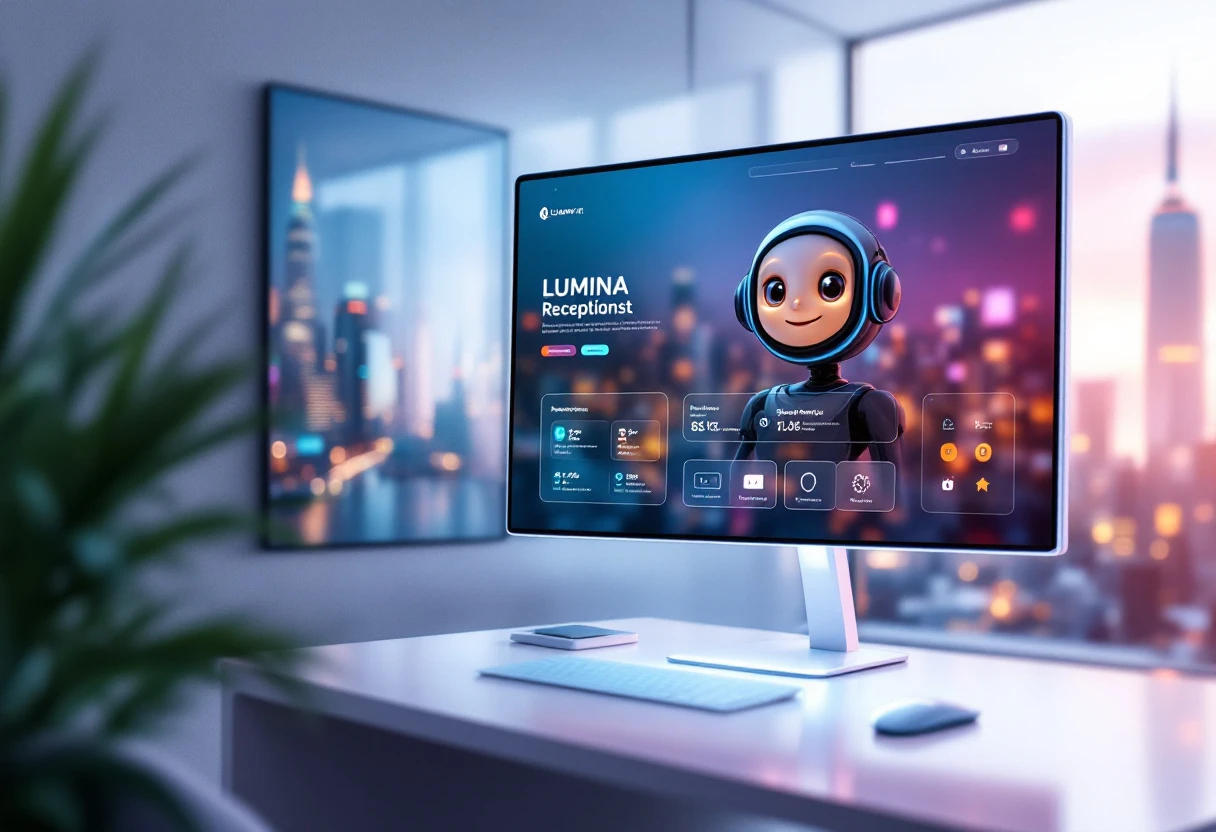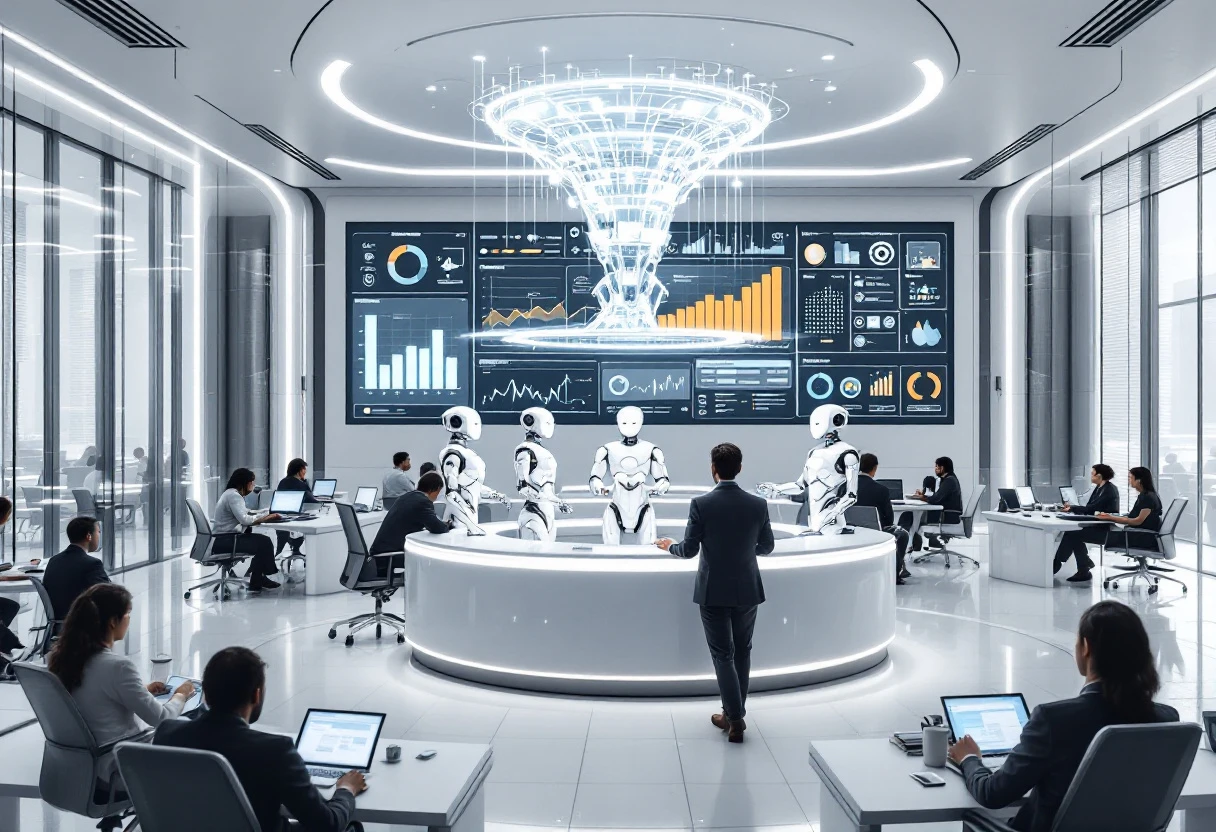
Are you looking to enhance your customer service experience while reducing operational costs? AI receptionists are revolutionizing how businesses manage customer interactions and generate leads. By automating routine tasks and providing 24/7 availability, these advanced systems can streamline your operations and improve customer satisfaction. Discover the various pricing models, key features, and future trends that can help your business thrive in a competitive landscape.
As businesses seek efficiency, the demand for automation grows. AI receptionists offer a practical solution, seamlessly integrating into customer service strategies. These systems manage inquiries, schedule appointments, and handle customer interactions 24/7, allowing businesses to focus on core operations. For instance, companies utilizing AI receptionists reported a 30% increase in customer engagement as they could respond to queries instantly without downtime.
According to a recent study, organizations that implement AI technologies see a 25% reduction in operational costs. This shift not only improves customer satisfaction but can also enhance lead generation techniques by keeping potential clients engaged at all times.
Lead generation strategies significantly benefit from AI receptionists by ensuring no opportunity goes unnoticed. With their capability to capture leads through chat, phone calls, and scheduling tools, these systems can automate initial outreach and warm up potential customers before human interaction is necessary.
For example, a small business implemented an AI receptionist, which managed leads that visited their website. Within a month, they noticed a remarkable increase in appointments booked:
This reflects a more streamlined lead generation process that ensures leads are nurtured effectively, resulting in higher conversion rates.
When evaluating AI receptionist pricing, businesses often consider the balance between cost savings and the efficiency of operations. By replacing traditional receptionists with AI-powered solutions, companies can reduce payroll expenses while improving service delivery:
| Cost Item | Traditional Receptionist | AI Receptionist |
|---|---|---|
| Average Annual Salary | $35,000 | $8,000 |
| Operational Hours | 40 hours/week | 24/7 availability |
This comparison highlights the significant savings and continuous availability offered by AI receptionists. Moreover, businesses can leverage data-driven insights to optimize their lead generation strategies further. As data analytics improves, so does the effectiveness of AI tools in translating customer interactions into sales. Ultimately, investing in AI customer service solutions can set a business apart in a competitive landscape.
In today's environment, where quick and effective communication is paramount, the choice for AI receptionists emerges as not just beneficial but essential. By transforming how companies interact with customers, these systems open doors to new growth opportunities.

When exploring AI receptionist pricing, businesses often encounter varied structures designed to cater to different needs. Tiered pricing can be particularly effective, offering several packages with distinct features, allowing companies to select an option that closely aligns with their requirements and budget.
For instance, a basic tier may include essential services like call answering and appointment scheduling, while higher tiers might offer advanced functionalities such as integrated CRM tools and analytics. This customization can significantly enhance lead generation efforts.
According to a recent study, companies that implement tiered pricing models see an average increase of 30% in their lead conversion rates. By providing clients with flexibility, businesses can engage more effectively with diverse clientele, ultimately driving growth. Learning about the benefits of tiered pricing can further explain how this strategy works.
Looking at successful examples, consider a real estate agency that adopted a customized pricing model for its AI receptionist services. By analyzing their target market, the agency introduced different packages tailored for luxury listings versus mid-range properties. The result? A remarkable 45% increase in inquiries and a substantial boost in leads generated for both segments.
In another case, a healthcare provider utilized AI-driven customer service with varied pricing levels for different services—from patient intake to appointment reminders. This clear delineation not only improved operational efficiency but also led to a smoother patient experience, thereby increasing repeat visits. Resources like case studies on AI receptionists can provide more insights into such successful applications.
"Adopting a tiered pricing model allowed us to address the unique needs of our clients and significantly increase our lead generation," said a representative from the healthcare provider.
Flexible pricing models offer multiple advantages that can positively impact a business’s lead generation strategy. Here are a few key benefits:
These strategies also align with heightened customer expectations in today’s landscape. A recent statistic showed that 78% of consumers prefer customized service offerings, emphasizing the need for adaptability in AI receptionist pricing. Companies can stay connected with their potential clients by utilizing services like adaptive pricing models, leading to better engagement.
In summary, understanding how to effectively implement varied pricing strategies is crucial. Resources on implementation strategies for AI services can help shape a thoughtful approach tailored to specific industry needs. Explore how investing in flexible pricing can empower your business to achieve sustained growth in lead generation and market reach.

When agencies adopt a white label solution, they can align the AI receptionist service with their brand. This practice builds client trust. Clients are more likely to engage with a recognizable brand that resonates with their values. Research shows that 71% of consumers prefer to purchase from brands they trust. Having the ability to customize an AI front desk service reinforces a brand’s image while promoting a sense of reliability and professionalism. Additionally, when clients view regular updates or improvements branded by their chosen agency, it cultivates loyalty.
A practical example can be seen in a digital marketing firm that integrated customizable receptionists. By using branded AI interfaces, they not only improved their service speed but also enhanced customer satisfaction by over 30%. Clients felt they were receiving personal service, all while interacting with a state-of-the-art solution.
The connection between brand identity and client relationships cannot be overstated. Using a white label AI receptionist allows agencies to foster a more personal connection. When clients experience consistent branding, it strengthens the perception that their needs are understood and valued. Client retention rates can improve significantly; companies with a strong brand identity see customer retention rates increase by as much as 60% over those without.
“Brand loyalty is built on consistent and engaging customer experiences, which the right automation can enhance.” – Marketing Expert
Furthermore, as the expectations for customer service rise, a strong identity that employs services like automated customer service can set agencies apart. This integration results in a seamless experience that can lead to positive reviews and referrals, further enhancing brand visibility.
Understanding ai receptionist pricing is crucial for agencies aiming to transform their service offerings. Without price transparency and tailored solutions, agencies may struggle to convey value to their clients. Competitive pricing can attract businesses looking for efficient service while fostering trust. When clients perceive they are receiving good value, they’re more likely to remain loyal. In fact, 60% of clients would choose to switch brands based on pricing alone, often feeling that cheaper options compromise quality.
To illustrate, consider a local business that opted for an affordable AI receptionist service through a white label partnership. They customized the interface to reflect their branding and included interactive features. As a result, they experienced a 25% increase in customer inquiry responses, leading to a marked improvement in lead generation. This was not merely a cost-cutting measure; it was a strategic move to bolster their brand perception in the industry.
Agencies should evaluate their service packages carefully, ensuring that they include competitive AI receptionist pricing. By packaging these services under their own brand, agencies can create a unique selling proposition that enhances customer relationships while fostering long-term loyalty.

Many businesses struggle with the cost of hiring and training additional personnel, especially when scaling operations or managing peak times. The implementation of AI receptionist services provides a way to streamline customer interaction, reducing the need for extensive human resources. By automating routine inquiries and appointment scheduling, companies can dramatically lower operational costs.
One compelling example comes from a mid-sized law firm that integrated AI receptionists into its operations. Before adopting this technology, the firm faced a waiting time of nearly 15 minutes for potential clients calling in during busy hours. After switching to an AI receptionist, the firm noted a 70% reduction in call handling times, leading to a 30% increase in client acquisition within the first quarter.
This transformation underscores an essential aspect of ai receptionist pricing: investing in automation can lead to significant long-term savings compared to traditional staffing costs. By spending less time and money on salary, benefits, and training for human staff, companies can reallocate these resources toward growth initiatives.
Many resellers have noted impressive benefits from adopting AI-led offerings. Consider an e-commerce company that decided to implement intelligent answering services. Initially, their customer service team handled around 200 inquiries daily, but struggled to maintain responsiveness during peak times. After implementing an AI Front Desk solution, daily inquiries managed by the AI system rose to 1,000, while customer satisfaction ratings climbed 20% within two months.
“AI gives us the bandwidth to focus on complex customer needs while ensuring every basic query is resolved quickly,” said the company’s operations director.
What makes this implementation remarkable is the before-and-after analysis. Prior to the AI system, the staffing cost for handling calls was substantial. Post-implementation, the company saw a quick return-on-investment (ROI) of over 150% within the first six months. This showcases how strategic technology adoption not only enhances performance but drastically changes the financial landscape of a business.
Despite these advantages, businesses must be cautious of potential financial pitfalls when integrating AI receptionists. Hidden costs can arise from poor implementation or lack of training. To mitigate these risks, consider the following strategies:
Statistics show that businesses that monitor AI performance regularly see 25% higher satisfaction rates from their customers, reflecting the need for continuous improvement.
AI technology is constantly evolving, and with it, the landscape of lead generation. Businesses now have access to tools that not only streamline processes but also analyze large amounts of customer data to predict future needs. For instance, AI algorithms can analyze browsing patterns, past purchases, and engagement levels to tailor marketing strategies. Such advanced analytics enable businesses to create highly personalized experiences for potential clients, enhancing overall effectiveness.
According to a recent Salesforce study, personalized marketing led to a 23% increase in revenue. This statistic highlights the importance of integrating customer data with AI systems to optimize lead generation efforts. As companies adopt more sophisticated AI receptionist solutions, such as AI Front Desk, they can leverage this technology to predict customer behavior more accurately.
To stay competitive, organizations must consider integrating AI features that are not just trendy but also practical. Future-proofing your lead generation strategy often involves looking at capabilities such as natural language processing and machine learning. These technologies can revolutionize the way businesses interact with potential leads.
For example, chatbots powered by AI can handle multiple inquiries simultaneously, providing instant responses to customer questions 24/7. This functionality significantly reduces the response time, which can improve customer satisfaction and increase conversion rates. If you’re looking to implement these solutions, refer to resources on effective implementation of AI technology that are readily available online.
Imagine being able to anticipate what a lead wants even before they express it. By analyzing behavioral data and trends, AI tools can suggest solutions or products tailored to each individual. This proactive approach can increase the likelihood of conversion, as customers often feel valued when their needs are prioritized.
As a practical example, one retailer used AI-driven analytics to send targeted promotions based on browsing history. This resulted in a 30% uptick in sales during promotional periods. To effectively capture this potential, businesses can harness multifunctional data analytics, which can yield insights into consumer preferences, thereby shaping how marketing strategies are developed.
Incorporating such advancements will serve you well. For those looking for clearer guidelines, consider exploring step-by-step guides on using data analytics in marketing. You’ll find practical advice on how to refine your lead generation strategies based on rich customer insights. The evolving landscape of AI receptionist pricing could significantly influence your strategy going forward.
“The companies that successfully adopt AI technology will set the pace for their industries in customer engagement.” - Industry Expert

Deciding on the right AI receptionist pricing model can significantly influence your lead generation strategy. Different pricing structures, such as pay-per-use, subscription-based, or tiered pricing, offer various advantages. For example, a pay-per-use model allows businesses to pay only for the actual services utilized, ensuring cost-effectiveness for smaller operations. Meanwhile, a subscription model provides predictable monthly expenses, beneficial for larger organizations aiming to streamline their customer service.
The value of a well-structured pricing strategy can’t be overstated. According to a survey, 80% of businesses reported improved lead conversion rates after implementing an AI receptionist system. This statistic illustrates how investing wisely in AI-powered solutions can yield tangible returns.
Businesses that incorporate AI receptionist solutions often see increased efficiency and improved customer interactions. Here are some notable advantages:
As an example, a medium-sized service company implemented a virtual receptionist and reported a 50% reduction in response time to customer queries within the first month. This not only enhanced customer satisfaction but also improved overall lead generation.
For businesses exploring these benefits, understanding how to implement effective strategies alongside the AI solutions is key. Resources that detail lead generation best practices can be invaluable for companies aiming to maximize their investment.
As AI technology continues to evolve, expect to see a shift in how businesses leverage these assistants. Some foreseeable trends include:
Adopting a proactive approach to these trends can prepare your business for significant growth. Implementing an AI receptionist is not merely about enhancing current systems; it’s about positioning your brand for the future.
To leverage these advantages effectively, look into tools that provide insightful analytics on customer interactions and performance metrics. This step is crucial in adapting your strategies as market dynamics evolve.
"With the right AI tools, businesses can not only enhance customer satisfaction but also significantly improve their lead conversion processes." - AI Industry Expert
Companies keen on exploring automated solutions should evaluate their AI technology features and how these can integrate with their current operations. As businesses adapt to the ongoing changes in customer behavior, the strategic use of natural language processing within AI systems can further refine lead generation approaches.
Ultimately, the key takeaway is this: thoughtful AI receptionist pricing models not only transform lead generation strategies but also align your business towards sustainable growth.
An AI receptionist is a software system that automates customer interactions. It can handle tasks such as answering inquiries, scheduling appointments, and managing leads 24/7, helping businesses improve efficiency and customer experience.
AI receptionists can streamline operations by automating routine tasks, reducing operational costs, and enhancing customer engagement. This technology allows businesses to focus on core activities while ensuring that leads are captured and nurtured effectively.
Implementing an AI receptionist can lead to significant cost savings. For instance, the average annual cost for an AI receptionist is around $8,000, compared to $35,000 for a traditional receptionist. This saves businesses money while providing 24/7 support.
Yes, there are various pricing models. Businesses can choose from pay-per-use, subscription-based, and tiered pricing structures. This flexibility allows companies to select a model that aligns with their needs and budget.
AI technology enhances lead generation by capturing leads through automated systems. It can also analyze customer behavior, send targeted follow-up messages, and manage inquiries efficiently, which can lead to higher conversion rates.
Businesses in various industries benefit from AI receptionists, including healthcare, real estate, e-commerce, and service-oriented sectors. These systems can adapt to different needs, making them valuable across many fields.
Yes, many AI receptionists can integrate with other business tools, such as Customer Relationship Management (CRM) systems. This integration helps streamline processes and improve data flow within organizations.
When choosing an AI receptionist, consider features such as automated call handling, intelligent follow-up messaging, 24/7 availability, and integration capabilities with other software tools to enhance operational efficiency.
To get started, research different AI receptionist providers, explore their features and pricing models, and consider trial periods to assess effectiveness. This approach will help ensure you choose a solution that meets your business's unique needs.
Start your free trial for My AI Front Desk today, it takes minutes to setup!






